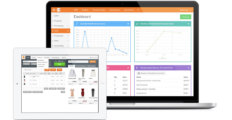Source: Statista, 2021
The leading social network has nearly 50,000 full-time workers spread globally. More than 60% of Facebook employees are located outside of the US. There are 82 Facebook offices across in North America, Latin America, Asia-Pacific, Africa, and the Middle East (Facebook, 2021).
Employee retention at Facebook is high with employees staying 2.3 years on average (Levitsky, 2020). One factor that contributes to lower employee attrition rates is the compensation and benefits package offered by the company.
For all the positive praise for Facebook’s progressive labor practices, there is still criticism, particularly in the areas of gender and ethnic equality in its workforce.
This article explores the number of full-time Facebook employees, compensation, rate of attrition, and employee demographics based on gender and race by digging deep into the categories below:
Number of Facebook Employees Table of Contents
Facebook Employment Facts
How many employees work at Facebook?
Facebook claims 44,942 full-time employees in its labor force. The social network titan boasts of 3,142 jobs spread out in 23 teams in its 82 offices across the globe. The biggest growth jump in employees was in 2006 where worker numbers jumped 900% to 450 employees from 150 in the previous year. The employment growth rate grew at an average of 44.34%. The rate has since slowed down 26.29% for 2019.
Employees in Menlo Park
Facebook’s headquarters in 1 Hacker Way is in the middle of a housing and mixed-use real estate project (van Romburgh, 2019). The 59-acre project aims to provide housing for Facebook’s over 15,000-strong local Menlo Park employees. The social media giant plans to create 1,500 permanent housing, 225 of which will be affordable.
Sky-rocketing housing costs are a common complaint among employees in the Silicon Valley area where the average monthly rent for a 2-bedroom apartment is between $2.500 to $4.500. The figure will easily cut into Facebook’s generous annual compensation of $120,000.
How many jobs did Facebook create?
Facebook claimed to have generated 450,000 jobs in Europe and in the US, based on studies released prior to the launch of the IPO. There were two versions of the study. The University of Maryland’s Business School did a study that claimed the social network generated over 235,644 jobs in the US, jobs in app and software companies. A similar study from Deloitte claims 232,000 jobs were generated from likes and engagement on Facebook business pages (Aguilar, 2014).
The news was met with skepticism from some sectors as Facebook only had 3,200 employees at the time of the studies’ release. Another point of contention was Facebook’s role in both studies; the data was supplied by Facebook and the Deloitte research was commissioned by Facebook itself.
Facebook Employee Compensation
Facebook is ranked the fifth largest Silicon Valley employer and pays above-average starting salaries. Annual base compensation starts at $120,000–$130,000 while total compensation packages are at a median of $150,000–$155,000.
It has consistently placed in the top ten rankings of Glassdoor’s annual Best Places to Work poll; placing first on several occasions, the last was in 2018. Facebook has since dropped to 11th place in the 2021 rankings (Glassdoor, 2021).
What is Mark Zuckerberg’s salary?
Facebook’s generous starting packages for interns range from $6,600–$9,500 per month, plus a bunch of other perks. At these starting rates, one wonders, “how much does Mark Zuckerberg make?” The Facebook CEO makes a dollar a year and joins Elon Musk of Tesla, Evan Spiegel of Snapchat, and Larry Page of Google in the $1 club (Crockett, 2019).
The $1 annual salary is mostly symbolic as these CEOs tend to earn compensation through other forms. In Mark Zuckerberg’s case, he earned a dollar in annual salaries, plus $23.4 million in other compensation for 2019 (Paycheck, 2021). He also owns 12.18 million Class A shares and 365.72 million Class B shares. Class A shares are common stocks ordinary people could own while Class B stocks, of which Zuckerberg owns 88.1% of, are shares with board voting rights.
With a net worth of $72 billion as of 2020, Zuckerberg can afford to live off his 1-dollar a year salary.
Source: Facebook; Morningstar
What is the average salary of a Facebook employee?
Facebook’s base compensation starts at $123,000 annually (Payscale, 2021); interns start at $6,700 a month according to Glassdoor (Glassdoor, 2021). Engineer positions are estimated to start in the $8,000–$10,000 range and data scientists are at the $12,000–$15,000 monthly. Additional benefits—health insurance, parental leave, relocation packages, among other things—increase total compensation value to about $155,000 a year.
Facebook Tenure and Employee Attrition Rates
Since ranking first place as the best place to work in 2018, Facebook has fallen 22 spots in 2020 rankings. A lucrative compensation and benefits package does not always equal employee loyalty. The average Facebook employee tenure is 2.3 years with an attrition rate of 5%.
Terrible managers and a heavy workload are the top reasons why employees leave a company; a lack of a clear management approach and leadership are applicable in Facebook’s case. The series of data leaks and other scandals that have plagued the company in 2018 and the responses to the aforementioned have caused Zuckerberg’s CEO rankings to drop below the top 50 and employees to be demoralized (Lapowsky, 2018).
Is Facebook a good place to work?
The high-energy startup vibe of tech companies like Facebook makes it attractive to interns trying to establish a career in Silicon Valley and tech veterans. Facebook is a good fit for both but criticisms, ranging from ageism to a lack of privacy and personal space in the open workspaces, to the inability to separate personal life from work life, have caused low morale among employees. This dissatisfaction has manifested in unfavorable reviews—anonymously posted and otherwise—on online forums Reddit, Quora, and the like.
How many employees did Facebook have when it went public?
The company had seven employees when Facebook launched in 2004. By the time Facebook launched its IPO, the workforce has grown to over 3,200.
Facebook employee turnover
Facebook has a low turnover rate of 5% and an average employee tenure between two to two and a half years. The year 2018 saw a rise in employee attrition rates when the company was dealing with backlash from user data leaks, management’s delayed response in dealing with the fallout, and several congressional hearings on fact-checking political ads and use of user data without owner consent.
Facebook Hiring Process
In a study ranking the top Silicon Valley employers, Facebook placed fifth on the list and now boasts a local employee headcount of over 15,000, making the company enticing to job hunters (Downey, 2019). So enticing that Facebook is said to receive over 250,000 applications a year, not counting inside referrals.
Source: Silicon Valley Business Journal, 2020
Similar to other multinational corporations, Facebook has a layered hiring process with three interviews to hurdle. The process is straightforward. Prospective employees send their resumes—either through a recruiter or through Facebook itself (Facebook Careers, 2021). Should the resume meet the hiring requirement, a Facebook recruiter will conduct a preliminary phone interview. A second phone interview follows with a team manager for the unit that’s hiring to check for role suitability. This progresses to an in-person interview and a visit to Facebook HQ (or where ever the Facebook office location is). A review of the application will be done and if the candidate is a good fit, an offer will be proposed.
How long is the interview process at Facebook?
As previously mentioned, Facebook has three possible interviews in its hiring process. The actual length will vary depending on the position and Facebook location applied at. With the volume of job applications Facebook goes through, the process usually takes three to four weeks with a few days to a week in between interviews.
Does Facebook send rejection emails?
The Facebook hiring team takes a week or two to go over hiring notes and input from all the managers a prospective employee interviewed with and the feedback from the candidate. Depending on the location or the hiring manager, the candidate will receive a call or an email to notify whether he or she got in or not, and advised when they could try again should they still be interested.
How often can you apply to Facebook?
Facebook’s recruitment and hiring policy recommend a one-year wait in-between applications. The reasoning for this is for the candidate to learn new skills and improve from experience. There is also a three-job application limit to ensure prospective employees who apply have core skills and are a good fit for the position applied for.
What are the job opportunities available at Facebook?
Facebook, now known as Meta, offers various job opportunities across multiple fields. Focusing on technology, innovation, and social connectivity, the company seeks talented individuals to fill roles in software engineering, data analysis, product management, marketing, and user experience design.
- Software Engineering: As one of the core functions, software engineers develop the platforms and tools that facilitate user interaction. Roles often require expertise in programming languages like Python, Java, or C++.
- Data Science and Analysis: Data-driven decision-making is crucial for Meta. Data scientists and analysts work on interpreting vast amounts of data to improve user experience and inform strategic business choices.
- Product Management: Product managers are responsible for guiding the development of new features and products, ensuring they align with user needs and company goals. This role often requires a blend of technical knowledge and business acumen.
- Marketing and Sales: With a focus on advertising solutions, marketing positions involve developing strategies to engage advertisers and enhance user engagement on platforms like Facebook, Instagram, and WhatsApp.
- User Experience Design: UX designers are vital in creating intuitive interfaces that enhance user satisfaction. This involves researching user behavior and testing new features before launch.
Facebook Employment Perks and Other Benefits
A good starting salary in Silicon Valley is usually matched with perks routinely described as impressive. VMware lets employees take two-day bereavement leave for the death of a pet and Airbnb gives an annual $2,000 allowance, which employees can use to check in to any listing around the world.
As for Facebook, some of the perks available to its employees include on-site laundry, all-day free meals and snacks, gym memberships or equivalent health programs, and valet parking (at Menlo Park), plus charging outlets for electric cars, among other things.
The compensation and benefits package is tempting but there is also the criticism that it only profits a few at the top, leaving others to fend for themselves (Wong, 2017).
What are the employee benefits at Facebook?
The social network’s employee benefits are numerous. It starts with a holistic health and wellness package that includes coverage for autism, transgender, and mental health issues. There is also a flexible spending account for dependent care and healthcare expenses (Facebook, 2021).
Additional monetary benefits that employees receive include equity incentive plans, restricted stock units, and performance bonuses.
What sets Facebook apart and what it excels in are family-oriented benefits like its caregiving program—extended leaves to take care of ill family members has been added as well as 20 days of bereavement leave.
| Insurance, Health & Wellness | Financial & Retirement | Family & Parenting | Vacation & Time Off | Perks & Discounts | Professional Support | |||||
| Health Insurance | 401K Plan | Maternity & Paternity leave | Vacation & PTO | Employee Discount Card | Diversity Program | |||||
| Dental Insurance | Retirement Plan | Dependent care | Sick Days | Free lunch or Snacks | Job Training | |||||
| Flexible Spending Account (FSA) | Performance Bonus | Childcare | Paid Holidays | Employee Assistance Program | Professional Development | |||||
| Vision Insurance | Restricted Stock Units (RSU) | Baby Bonus | Bereavement Leave | Gym Membership | ||||||
| Health Insurance | Family Medical Leave | Commuter Checks & Assistance | ||||||||
| On-Site Health Care | Mobile Phone Discount | |||||||||
| Mental Health care | Company Social Events |
Do Facebook employees get stock?
Facebook employees get restricted stock units (RSU). RSUs keep their value, unlike stocks that fluctuate in the market; RSUs can be sold after four years. Facebook has the option to buy back RSUs from their employees at the same price it was issued, regardless of price drops.
Stock options were no longer an option prior to the company’s IPO in 2012. In fact, Facebook started offering RSUs to employees in 2007 to avoid diluting ownership and going over the 500 shareholder limit allowed by SEC to keep company financials private.
What is the company culture at Facebook?
Facebook’s company page touts a progressive and inclusionary workplace accepting of diverse backgrounds. Reviews on Glassdoor and Indeed are often positive. There is occasional dissent from former employees, describing the atmosphere as cult-like and intense. But nothing too scandalous to merit national headlines.
Facebook turned 17 and with age comes growth and maturity. The company isn’t a startup anymore and has dealt with its share of failures. It has also improved where it is lacking; addressing changes in employee benefits, affordable housing concerns, and equality and diversity in its employees.
How many Facebook employees became millionaires?
There is no exact data on how many of Facebook’s employees became millionaires after the IPO. The claim “Facebook will create 1,000 millionaires” became a catchphrase to describe the IPO fever that swept the tech world in the days leading to Facebook going public.
The bigger names from the company’s roster did become millionaires, billionaires for some. Leading the list of billionaires are the founders who built the website from the ground up—Mark Zuckerberg, Dustin Moskovitz, Eduardo Saverin, and Chris Hughes (Hughes, 2019).
Source: Business Insider
Employees in smaller roles when Facebook launched its IPO experienced windfalls but did not quite reach millionaire status. Antonio Garcia Martinez, a former product manager at Facebook wrote of his time in the company (García Martínez, 2021). He recalls the onslaught of luxury cars popping up in the office parking lots and four-digit restaurant bills after Facebook went public.
Facebook Employee Demographics
The average age of a Facebook user is between the ages of 18–24 years old in its early years. The user base has grown with the company with current worldwide user stats placing the average user age between 25–34 years old.
Employee age is closer to current user statistics–fresh off college or millennial. While the gender divide is still far from equal, Facebook is taking steps to address the unequal gender representation among its employees.
Facebook average employee age
Origin stories for legendary tech companies follow the pattern of a young, nerdy outsider coding their way to millions in their dorm room or their parents’ garage. Silicon Valley is filled with these young tech workers. How young?
One study comparing the median age of employees at various tech companies showed Facebook has one of the youngest employee median age among tech companies. The median age for Facebook employees is 28. The oldest in the range is 39 (Payscale, 2016).
Facebook’s female board members
The skew between male and female employees and leaders in tech has been raised many times in the discussion of gender inequality in the workplace. The imbalance is strongly felt in the tech industry. Attempts have been made to address the imbalance not just in Silicon Valley but across all sectors. Facebook appointed two female directors to its board, bringing the number of female board directors to 40% (Bursztynsky, 2020).
Facebook employee gender ratio
Facebook has been tracking its employee gender equality since 2014. The results are dismal—women make up only a third of the total global Facebook workforce.
The numbers are slowly increasing; the proportion is climbing gradually but it may take longer to equalize.
Source: Statista, 2021
The disparity is most felt in the tech department where women make up less than 25% of the employee count. The business and sales department has reverse-inequality; women outnumber the men three to one.
Source: Facebook
Facebook employees’ ethnicity
The Facebook Diversity Report for 2020 focused on increasing employment and representation for women and other underrepresented groups, as well as assisting vulnerable communities impacted by the COVID-19 pandemic (Williams, 2020).
White employees make up more than 40% of employee numbers followed closely by Asians at just over 30%. The remaining is composed of Blacks, Hispanics, and mixed races (Williams, 2020).
Source: Facebook, 2020
Similar to the trend in gender gap, which is gradually decreasing, the same can be observed in employees’ ethnicity as the share of employees with ethnicity other than white grows.
Source: Statista, 2021
Key Insights
- Global Workforce Distribution: Facebook has nearly 50,000 full-time employees globally, with over 60% located outside the US, across 82 offices in North America, Latin America, Asia-Pacific, Africa, and the Middle East.
- Employee Retention and Compensation: The average employee tenure at Facebook is 2.3 years, supported by competitive compensation packages. The median total compensation package is approximately $150,000–$155,000 annually, with a base salary starting at $120,000–$130,000.
- Gender and Ethnic Diversity: Despite efforts to improve diversity, only 37% of Facebook’s global workforce are women, with women making up less than 25% of the tech department. Ethnic diversity shows that over 40% of US employees are White, followed by over 30% Asian, with other ethnicities making up the remainder.
- Employee Benefits and Perks: Facebook offers extensive benefits, including health insurance, parental leave, stock units, and performance bonuses. Unique perks include on-site services such as laundry and free meals, gym memberships, and valet parking.
- Hiring and Employee Growth: Facebook’s workforce grew significantly from 150 employees in 2005 to nearly 50,000 in 2021. The hiring process is rigorous, often taking three to four weeks with multiple interviews. Facebook receives over 250,000 applications annually.
- Challenges and Criticisms: While Facebook is known for high energy and attractive compensation, it faces criticism for issues like intense workloads, lack of privacy, and ageism. Employee attrition spiked during periods of scandal and controversy.
FAQ
- How many employees work at Facebook? Facebook has nearly 50,000 full-time employees globally, with more than 60% located outside the US.
- What is the average tenure of a Facebook employee? The average tenure of a Facebook employee is 2.3 years.
- What benefits do Facebook employees receive? Facebook employees receive comprehensive benefits, including health insurance, parental leave, stock units, performance bonuses, on-site services, and gym memberships.
- How does Facebook’s compensation compare to other tech companies? Facebook’s compensation is competitive, with a base salary starting at $120,000–$130,000 and total compensation packages around $150,000–$155,000 annually.
- What is the gender ratio at Facebook? Women make up 37% of Facebook’s global workforce, with less than 25% in the tech department.
- How diverse is Facebook’s workforce in terms of ethnicity? In the US, over 40% of Facebook employees are White, followed by over 30% Asian, with other ethnicities comprising the rest.
- What is Mark Zuckerberg’s salary? Mark Zuckerberg has a symbolic salary of $1 per year but earns significant compensation through other means, including stock options.
- What are some of the criticisms faced by Facebook as an employer? Facebook faces criticism for intense workloads, lack of privacy, ageism, and difficulties in maintaining a balance between personal life and work.
- How many applications does Facebook receive annually? Facebook receives over 250,000 job applications annually.
- What is Facebook’s hiring process like? Facebook’s hiring process typically involves three interviews, taking around three to four weeks, and includes a review by multiple managers before an offer is made.
References:
- Aguilar, A. (2014). The global economic impact of Facebook. Deloitte.
- Bursztynsky, J. (2020, March 9). Facebook names two women to its board, nearing gender parity. CNBC.
- Crockett, Z. (2019, December 8). Why some of America’s top CEOs take a $1 salary. The Hustle.
- Downey, R. (2019, August 2). Largest Silicon Valley employers. BizJournals.
- Facebook. (2021). Company info. Facebook.
- Facebook. (2021). Facebook benefits. Facebook Careers.
- Facebook. (2021). Facebook life. Facebook Careers.
- García Martínez, A. (2021). Chaos Monkeys. Antonio García Martínez.
- Glassdoor. (2021). 2021 best places to work. Glassdoor.
- Glassdoor. (2021). Facebook salaries. Glassdoor.
- Hughes, C. (2019, May 9). It’s time to break up Facebook. New York Times.
- Lapowsky, I. (2018, December 20). The 21 (and counting) biggest Facebook scandals of 2018. Wired.
- Levitsky, A. (2020, December 30). Facebook no longer has Silicon Valley’s highest employee turnover, LinkedIn user data shows. BizJournals.
- Paycheck. (2021). Salary Mark Zuckerberg. PayCheck.
- PayScale. (2016). PayScale compares top tech companies. PayScale.
- PayScale. (2021). Average salary for Facebook Inc employees. PayScale.
- van Romburgh, M. (2019, October 8). Menlo Park officials nudge Facebook to prioritize housing over office at massive Willow Village project. BizJournals.
- Williams, M. (2020, July 15). Facebook 2020 Diversity Report: Advancing opportunity for all. Facebook.
- Wong, J. (2017, September 26). Facebook’s underclass: as staffers enjoy lavish perks, contractors barely get by. The Guardian.























Tenure at 2.5 years and turnover 5%? The math doesn’t come close to matching. I’ve worked in HR for 40 years and I’d get fired if we averaged 2.5 years tenure.
Leave a comment!